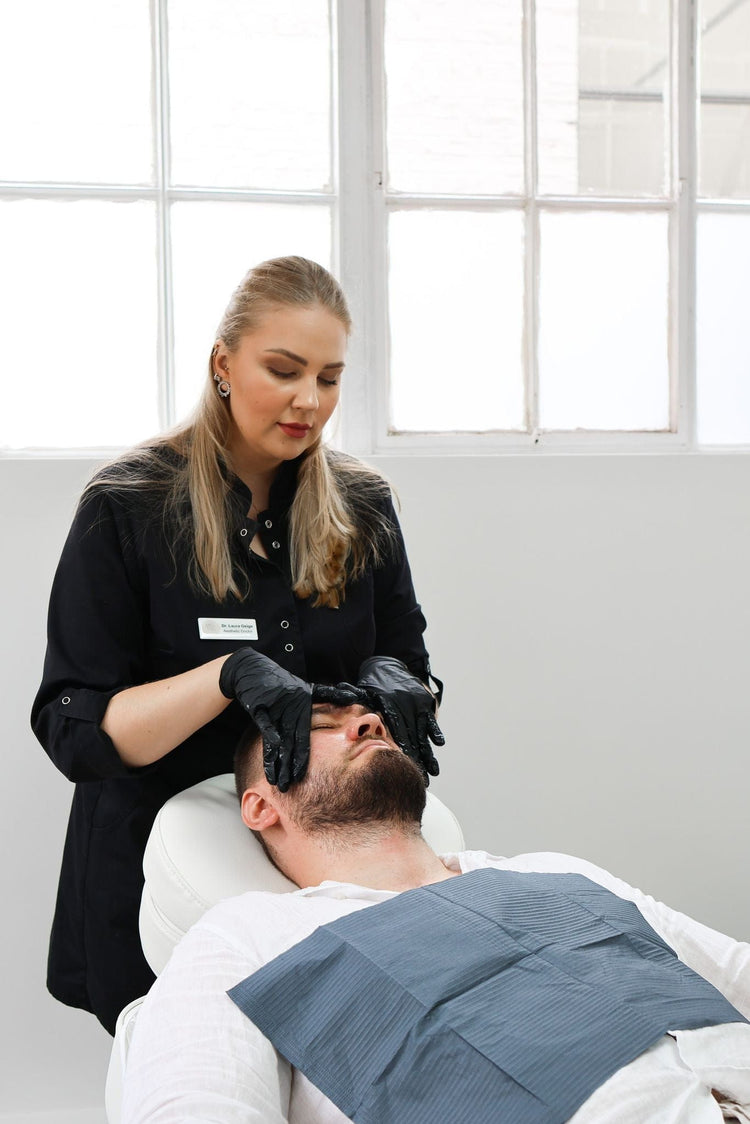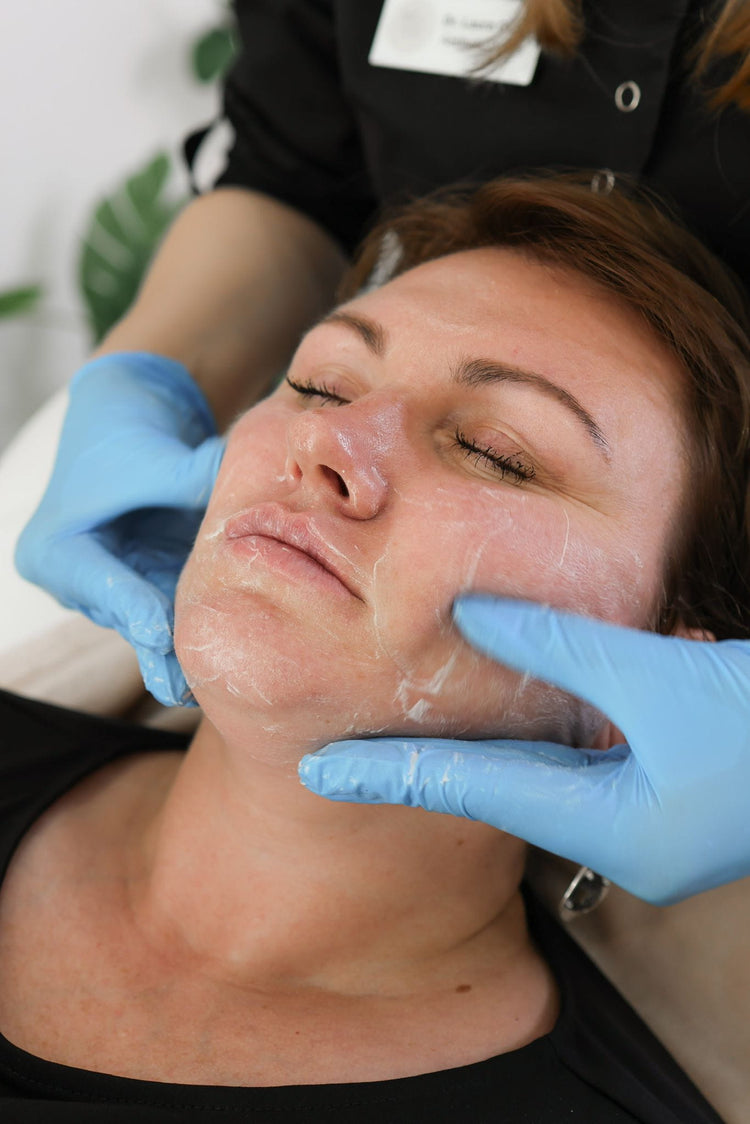Initial Consultation and History Taking
The initial consultation and history taking are crucial steps in addressing underlying skin conditions. During this stage, a dermatologist will gather detailed information about your medical history, current symptoms, lifestyle habits, and any previous treatments you’ve tried. This comprehensive assessment allows for a thorough understanding of your skin concerns and helps formulate a personalized treatment plan that targets the root cause of the problem.
Detailed Medical History
A thorough medical history is essential to understand the complexities of skin conditions. This involves exploring past medical conditions, allergies, medications, and family history of skin issues. It’s also important to discuss current skincare routine, including products used, sun exposure habits, and any recent changes in diet or lifestyle. By gaining a comprehensive understanding of your individual circumstances, dermatologists can identify potential contributing factors and develop a treatment plan tailored to your specific needs.

Skincare Routine Assessment
Understanding the complexities of skin conditions begins with a thorough history taking process. This involves an in-depth discussion about past medical conditions, allergies, current medications, and any family history of skin issues. A comprehensive overview of your skincare routine is also essential, including details about the products used, sun exposure habits, and recent changes in diet or lifestyle.
By gaining a detailed understanding of your individual circumstances, dermatologists can pinpoint potential contributing factors to your skin concerns. This allows them to develop a personalized treatment plan that addresses the root cause of the problem rather than merely masking symptoms.
Current Skin Concerns and Goals
The initial consultation and history taking are crucial steps in addressing underlying skin conditions. During this stage, a dermatologist will gather detailed information about your medical history, current symptoms, lifestyle habits, and any previous treatments you’ve tried. This comprehensive assessment allows for a thorough understanding of your skin concerns and helps formulate a personalized treatment plan that targets the root cause of the problem.

A thorough medical history is essential to understand the complexities of skin conditions. This involves exploring past medical conditions, allergies, medications, and family history of skin issues. It’s also important to discuss current skincare routine, including products used, sun exposure habits, and any recent changes in diet or lifestyle. By gaining a comprehensive understanding of your individual circumstances, dermatologists can identify potential contributing factors and develop a treatment plan tailored to your specific needs.
- Past medical conditions
- Allergies
- Current medications
- Family history of skin issues
- Current skincare routine
- Products used
- Sun exposure habits
- Recent changes in diet or lifestyle
By gaining a detailed understanding of your individual circumstances, dermatologists can pinpoint potential contributing factors to your skin concerns. This allows them to develop a personalized treatment plan that addresses the root cause of the problem rather than merely masking symptoms.
Diagnosis and Treatment Planning
Diagnosing and treating skin conditions effectively requires a thorough understanding of the individual’s medical history and lifestyle. During an initial consultation, dermatologists meticulously gather information about past illnesses, allergies, current medications, and family history of skin issues.
A comprehensive assessment of the patient’s skincare routine, including products used, sun exposure habits, and recent dietary or lifestyle changes, is also crucial. This detailed evaluation allows dermatologists to identify potential contributing factors to the skin condition and develop a personalized treatment plan that targets the root cause of the problem.

Physical Examination of the Skin
A fundamental aspect of diagnosing and treating skin conditions effectively involves a meticulous physical examination of the skin. This examination allows dermatologists to visually assess various aspects of the skin, such as its color, texture, and any visible abnormalities.
During a physical examination, dermatologists will systematically examine different areas of the skin, paying attention to signs such as rashes, lesions, discoloration, or any unusual growths. They may also use tools like a dermatoscope to magnify skin structures for closer inspection.
By carefully observing these details, dermatologists can gain valuable insights into the nature and extent of the skin condition. This information, combined with the patient’s medical history and lifestyle information, helps formulate an accurate diagnosis and develop an appropriate treatment plan.
Identifying Underlying Conditions
Diagnosing and treating skin conditions effectively requires a thorough understanding of the individual’s medical history and lifestyle. During an initial consultation, dermatologists meticulously gather information about past illnesses, allergies, current medications, and family history of skin issues.
A comprehensive assessment of the patient’s skincare routine, including products used, sun exposure habits, and recent dietary or lifestyle changes, is also crucial. This detailed evaluation allows dermatologists to identify potential contributing factors to the skin condition and develop a personalized treatment plan that targets the root cause of the problem.
- Past medical conditions
- Allergies
- Current medications
- Family history of skin issues
- Current skincare routine
- Products used
- Sun exposure habits
- Recent changes in diet or lifestyle
By gaining a detailed understanding of your individual circumstances, dermatologists can pinpoint potential contributing factors to your skin concerns. This allows them to develop a personalized treatment plan that addresses the root cause of the problem rather than merely masking symptoms.
Developing a Personalized Treatment Plan
Developing an effective treatment plan for skin conditions begins with a thorough understanding of the individual’s medical history, lifestyle factors, and current skin state. Dermatologists meticulously gather information about past illnesses, allergies, current medications, and family history of skin issues during an initial consultation.
A comprehensive evaluation of the patient’s skincare routine is also crucial, including details about the products used, sun exposure habits, and recent dietary or lifestyle changes. This detailed information allows dermatologists to identify potential contributing factors to the skin condition.
Based on this comprehensive assessment, a personalized treatment plan is developed, addressing the root cause of the problem rather than merely masking symptoms. Treatment options may include topical medications, oral medications, light therapy, chemical peels, laser therapy, or surgical procedures.
The specific treatment chosen will depend on the diagnosis and individual patient needs. It is important for patients to follow their dermatologist’s instructions carefully and attend all follow-up appointments to ensure optimal results and monitor for any potential complications.
Treatment Options for Underlying Conditions
Treating skin conditions effectively requires a multi-faceted approach that goes beyond simply addressing surface symptoms. Dermatologists recognize that underlying medical conditions, lifestyle factors, and individual patient characteristics play a crucial role in the development and severity of skin problems. By carefully evaluating these factors during an initial consultation, dermatologists can develop personalized treatment plans that target the root cause of the issue.
Acne
Treatment options for underlying conditions contributing to acne vary depending on the specific diagnosis. If hormonal imbalances are identified as a factor, hormone therapy may be recommended to regulate menstrual cycles or address androgen excess. In cases of polycystic ovary syndrome (PCOS), medication to manage hormones and insulin resistance might be prescribed.
For individuals with inflammatory skin conditions like rosacea or eczema that exacerbate acne, addressing the underlying condition is crucial. This may involve medications to control inflammation, reduce redness, and improve skin barrier function.
Lifestyle modifications play a vital role in managing acne. A dermatologist might recommend dietary adjustments, stress management techniques, and regular exercise to promote overall health and support skin health.
Rosacea
Treatment options for underlying conditions contributing to rosacea vary depending on the specific diagnosis. If hormonal imbalances are identified as a factor, hormone therapy may be recommended to regulate menstrual cycles or address androgen excess. In cases of polycystic ovary syndrome (PCOS), medication to manage hormones and insulin resistance might be prescribed.
For individuals with inflammatory skin conditions like rosacea or eczema that exacerbate acne, addressing the underlying condition is crucial. This may involve medications to control inflammation, reduce redness, and improve skin barrier function.
Lifestyle modifications play a vital role in managing rosacea. A dermatologist might recommend dietary adjustments, stress management techniques, and regular exercise to promote overall health and support skin health.
Eczema
Treatment options for underlying conditions contributing to eczema vary depending on the specific diagnosis. If allergies are identified as a factor, allergen avoidance and antihistamine medications may be recommended. For individuals with inflammatory skin conditions like psoriasis or atopic dermatitis that exacerbate eczema, addressing the underlying condition is crucial. This may involve medications to control inflammation, reduce itching, and improve skin barrier function.
Lifestyle modifications play a vital role in managing eczema. A dermatologist might recommend avoiding triggers such as harsh soaps, detergents, or certain fabrics, along with strategies for stress management, regular exercise, and adequate sleep.
Psoriasis
Treatment options for underlying conditions contributing to psoriasis vary depending on the specific diagnosis. If autoimmune disorders are identified as a factor, medications to suppress the immune system, such as biologics or disease-modifying antirheumatic drugs (DMARDs), may be recommended.
For individuals with inflammatory skin conditions like eczema that exacerbate psoriasis, addressing the underlying condition is crucial. This may involve medications to control inflammation, reduce itching, and improve skin barrier function.
Lifestyle modifications play a vital role in managing psoriasis. A dermatologist might recommend avoiding triggers such as stress, certain foods, or environmental pollutants, along with strategies for stress management, regular exercise, and adequate sleep.
Hyperpigmentation
Treatment options for underlying conditions causing hyperpigmentation vary depending on the specific cause. If hormonal imbalances contribute to the pigmentation, medications to regulate hormone levels might be prescribed.
For individuals with inflammatory skin conditions like acne or eczema that exacerbate hyperpigmentation, addressing the underlying condition is crucial. This may involve medications to control inflammation, reduce redness, and improve skin barrier function.
Lifestyle modifications play a vital role in managing hyperpigmentation. A dermatologist might recommend avoiding sun exposure, using broad-spectrum sunscreen daily, and incorporating ingredients like vitamin C or niacinamide into skincare routines to brighten the skin and even out pigmentation.
Follow-Up Care and Monitoring
Follow-up care and monitoring are crucial components of successful skin treatment. After an initial consultation where underlying conditions have been identified, dermatologists will create a personalized treatment plan. Regular follow-up appointments allow for ongoing evaluation of progress, adjustments to the treatment regimen as needed, and early detection of any potential complications. This proactive approach ensures that the treatment remains effective and addresses evolving skin concerns.
Progress Checkups
Follow-up care and monitoring are crucial components of successful skin treatment. After an initial consultation where underlying conditions have been identified, dermatologists will create a personalized treatment plan. Regular follow-up appointments allow for ongoing evaluation of progress, adjustments to the treatment regimen as needed, and early detection of any potential complications. This proactive approach ensures that the treatment remains effective and addresses evolving skin concerns.
- Ongoing Evaluation of Progress
- Adjustments to Treatment Regimen
- Early Detection of Complications
Adjusting Treatment Plans
Follow-up care and monitoring are essential parts of successful skin treatment. After a dermatologist has identified the underlying conditions contributing to your skin concerns, they will develop a personalized treatment plan. Regular follow-up appointments allow for:
* **Ongoing Evaluation of Progress:** Your dermatologist will assess how well you are responding to the treatment and make note of any improvements or setbacks.
* **Adjustments to Treatment Regimen:** Based on the evaluation, your dermatologist may need to adjust the dosage of medications, change the type of treatment, or add new therapies to optimize your results.
* **Early Detection of Complications:** Follow-up appointments help identify potential side effects or complications early on, allowing for prompt intervention and minimizing any adverse outcomes.
This proactive approach ensures that your treatment remains effective and addresses any evolving skin concerns you may have.
Long-Term Skin Health Management
Follow-up care is crucial for the long-term health of your skin. After an initial consultation where a dermatologist has assessed your skin concerns and identified any underlying conditions, they will create a personalized treatment plan.
- Ongoing Evaluation:
- Treatment Adjustments
- Early Detection of Issues
Regular follow-up appointments allow the dermatologist to monitor your progress, make adjustments to the treatment plan as needed, and address any new concerns that arise. This ongoing care ensures that your skin remains healthy and that you achieve the best possible outcome.
Book your skin rejuvenation treatment with Dr. Laura Geige at It’s Me & You Clinic
- What Is The Temporal Filler Technique? - November 26, 2025
- Why Does Filler Migrate Above Lip - November 11, 2025
- What Is The Best Skin Booster For Smokers Lines? - November 10, 2025
